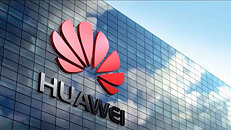Monday, March 30th 2020

U.S. Government Tightens Screws on Huawei's Global Chip Supply from TSMC
The U.S. government announced advanced measures that make it harder for foreign companies, such as Taiwan's TSMC, to supply chips to Chinese telecom hardware giant Huawei. Foreign companies that use American chipmaking equipment, are required to obtain a license from the U.S. before supplying certain chips to Huawei. Sources comment that the new rule was tailor-made to curb TSMC fabricating smartphone SoCs for Huawei's HiSilicon subsidiary.
Mainland Chinese semiconductor companies are still behind Samsung and TSMC in 7 nm-class fab technologies, forcing HiSilicon to source from the latter. 7 nm fabrication is a key requirement for SoCs and modem chips capable of 5G. The high data transceiving rates of 5G requires a certain amount of compute power that can fit into smartphone-level power-envelopes only with the help of 7 nm, at least for premium smartphone form-factors. Same applies to 5G infrastructure equipment. This is hence perceived as a means for the U.S. to clamp brakes on Huawei's plans of playing a big role in 5G tech rollouts around the world, buying western 5G tech suppliers such as Nokia time to catch up. Huawei has been a flashpoint for a bitter political spat between the U.S. and China, with the Chinese press even threatening that the matter could hamper medical supplies to the U.S. to fight the COVID-19 pandemic.Trade experts however believe that driving a legal wedge between HiSilicon and TSMC will be counterproductive to American objectives. The move could force the Chinese government to invest more in homebrew semiconductor manufacturing companies such as SMIC, and accelerate its 7 nm and future tech rollouts. "This is going to have a far more negative impact on U.S. companies than it will on Huawei, because Huawei will develop their own supply chain," trade lawyer Doug Jacobson said. "Ultimately, Huawei will find alternatives."
Source:
Reuters
Mainland Chinese semiconductor companies are still behind Samsung and TSMC in 7 nm-class fab technologies, forcing HiSilicon to source from the latter. 7 nm fabrication is a key requirement for SoCs and modem chips capable of 5G. The high data transceiving rates of 5G requires a certain amount of compute power that can fit into smartphone-level power-envelopes only with the help of 7 nm, at least for premium smartphone form-factors. Same applies to 5G infrastructure equipment. This is hence perceived as a means for the U.S. to clamp brakes on Huawei's plans of playing a big role in 5G tech rollouts around the world, buying western 5G tech suppliers such as Nokia time to catch up. Huawei has been a flashpoint for a bitter political spat between the U.S. and China, with the Chinese press even threatening that the matter could hamper medical supplies to the U.S. to fight the COVID-19 pandemic.Trade experts however believe that driving a legal wedge between HiSilicon and TSMC will be counterproductive to American objectives. The move could force the Chinese government to invest more in homebrew semiconductor manufacturing companies such as SMIC, and accelerate its 7 nm and future tech rollouts. "This is going to have a far more negative impact on U.S. companies than it will on Huawei, because Huawei will develop their own supply chain," trade lawyer Doug Jacobson said. "Ultimately, Huawei will find alternatives."

21 Comments on U.S. Government Tightens Screws on Huawei's Global Chip Supply from TSMC
Not the first time TPU writes stuff about this USvsHuawei from the perspective that things have already happened, when in reality they've only been planned at that point.
This is potentially being done because of China's overall actions concerning trade, trying to control the market and tech with such up to the point of the theft of intellectual properties and so on in these efforts.
China does want to be independent but at the price of everyone else depending on them for it all, constituting a monopoly they would control and you know what that means.
China isn't as far behind as one may think, they've been doing theft of intellectual properties for decades now and will certainly continue doing such for as long as they can.
One thing I can say is the Chinese aren't dumb, they've been working to reach the place they are now and the payoff for them is as described. Speaking of investment, that was another angle they took to become a/the dominant world power and we're helping to pay for this investment through the trading we've been doing at a deficit to them over it - Actually we've been doing that since 79 when Carter signed the first trade deal with them and it's just gone from there.
The US is looking to curb this increased influence and control largely for it's own sakes, that's a given and if the US wants to retain it's lead in the thing it does lead in that's what they'll have to do. Doesn't matter what country you are from, it's a fair statement to say if it's something you have to do to protect your own interests then you do it or suffer from lack of doing it.
In case this post looks off topic, I don't think it is. The fact that Huawei is a Chinese company is convenient at this time.
And ROC is not a member of the UN.
As for this Huawei spat... its painfully obvious the West is losings its technological advantage and its about time we do something with it on a larger scale. This measure is just one way to tackle that problem... you do need to have your own initiative for new tech going forward as well. Just blocking TSMC isn't going to change things, merely postpone them.
EDIT: adding source quote:
en.wikipedia.org/wiki/Foreign_relations_of_Taiwan#Full_diplomatic_relations
In 1971, the UN expelled the ROC and transferred China's seat to the People's Republic of China (PRC). In addition to the ad tempus recognition of the ROC by a majority of countries before UN Resolution 2758, the ROC lost its membership in all the intergovernmental organisations related to the UN.
I wonder who was behind that... ;)
Check this list:
en.wikipedia.org/wiki/Foreign_relations_of_Taiwan#Full_diplomatic_relations
China has worked for decades to tying most other countries to his prices and moving most of production to China. They are strongly determined to achieve economic supremacy and quick and dirty solutions, like Trump's acts do not work much to them.
China isn't going to stop what they are doing on their own.
Huawei, being state owned and ran has already been proven as a vehicle of the state with dealings on the nefarious side of things.
Trump's "Rhetoric" speaks to the necessity of at least taking some kind of action and he's in the right to do so.
At least he's got the nads to stand up and do something whether you like his style or not.
If he or any other doesn't take action to protect "Us" then they certainly are not doing their job no matter who they are and it's fair to say any other country would have to do the same in this circumstance to protect their own.
If you're content to lay back and let China do whatever that's what you'll get and it won't be in your favor since they certainly favor their own people....
OH!
My bad - That's agenda, not people.
China and the Communist party (speaking of which, nothing of China's is really communist in the sense of being Marxist, according to Political Scientists, China is best described as a highly centralized authoritarian capitalist government, FYI) with respect to technology is despicable, especially with the blatant stealing of IP. With respect to Huawei, is there really anyone here that truly believe that company isn't in bed with the communist party in some form? I feel like trusting sensitive infrastructure components from a Chinese company is as asinine as trusting components, for example, from a Russian company (Kaspersky anyone?)
A reminder, this is TPU, not a political board. Frankly, if the US worries who is using their "American chipmaking equipment"... if whoever is using it is doing so under a license, then the US can ask for whatever they want. On the other hand, if the equipment was sold under a set of conditions at the time, trying to change them after the fact is sh*tty.
ASML and various Korean, German, Taiwanese & Chinese firms must be rubbing their hands.
Also, TSMC will almost certainly disobey this (whilst divesting its supply chain of US products) if the US doesn't back down. The US won't impose sanctions on them because it would totally cripple the US semiconductor business.Yet your entire message is political.
Also you seem to appear to agree with Xi and other hardliners that Taiwan & China are the same entity. Bit strange for someone who seems anti-Chinese. Bit of cognitive dissonance going on?
The idea that the US can apply its own laws globally is a uniquely US view. Typical American exceptionalism and completely against any standards, and without any logic, legal or ethical basis. In many ways, the US is much more of a pariah than China is.